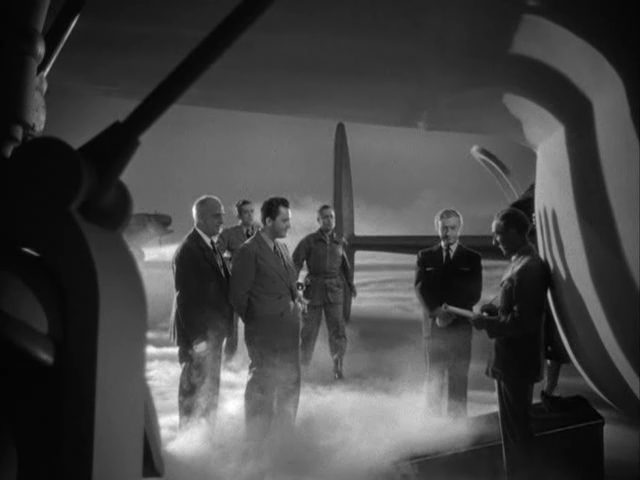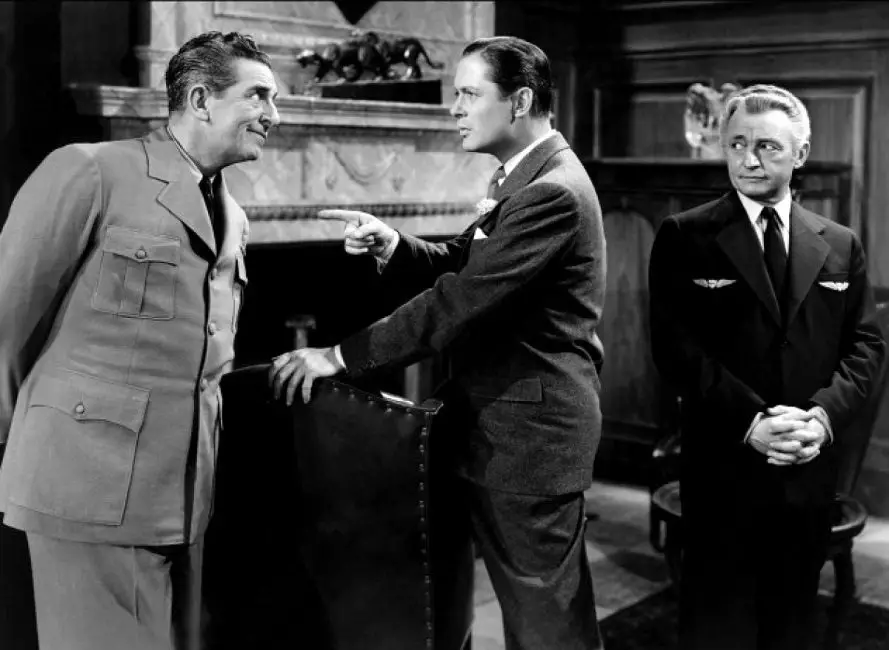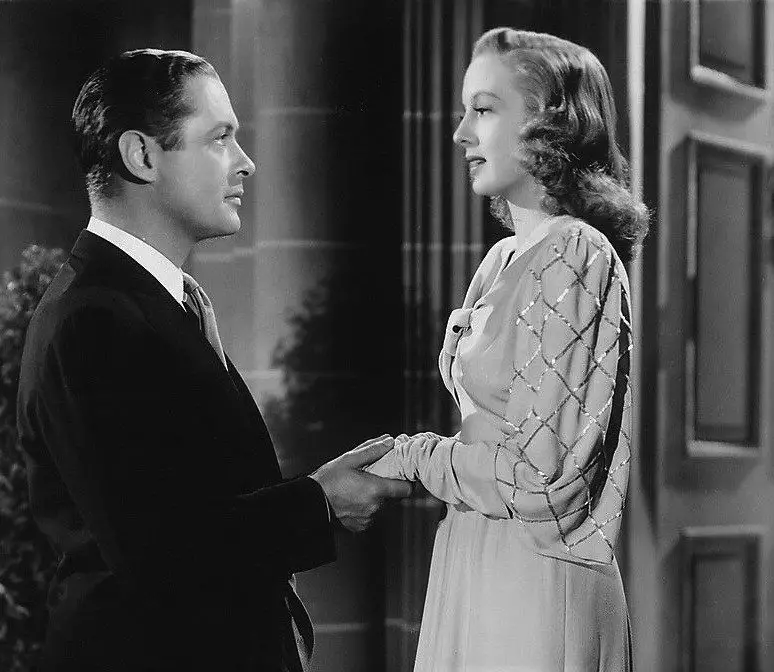“So long, champ.”
Many people have heard of film noir, but few have heard of the genre that sprung up in response, film blanc. Much like noir, blanc’s definition is hazy and hotly debated. But unlike noir, blanc films are usually fantastical and deal with life after death, and unlike noir, they feature the best of people.
Alexander Hall’s Here Comes Mr. Jordan is a prime example of the genre. Hall’s career spans from the silent era to the 1950s. Yet, despite working with stars like Mae West and Shirley Temple, he’s largely forgotten or ignored today.
Here Comes Mr. Jordan is a movie practically perfect in every way. It is a fantastical romantic comedy about a prizefighter who dies before his time. The movie is amusing but never overly funny, yet somehow deeply affecting. Helped by a script from Sidney Buchman and Seton Miller, Hall delivers a movie that is at once shrewdly calculated while somehow always feeling as if the filmmakers were improvising.

The story itself is a little cock-eyed. Joe Pendelton (Robert Montgomery) dies in a plane crash and ends up in heaven. Refusing to believe it’s his time, he argues with his guardian angel, Messenger 7013 (Edward Everett Horton). Joe is so stubborn that Messenger 7013 takes him to his boss, Mr. Jordan (Claude Rains), the Invisible Man himself.
Messenger 7013 is a flustered, nervous wreck, a usual role for Horton, who made a career out of playing second banana to Fred Astaire and Ginger Rogers. The ever-debonair Rains as Mr. Jordan goes through the channels and discovers that Joe is right—it isn’t his time. It turns out God, the universe, Heaven, or whoever is quite fallible.
Joe isn’t supposed to die for another fifty years. I’m no stranger to watching older movies, but hearing a movie made in 1941 name check the year 1991 is still an odd and borderline discombobulating thing to hear. It’s one thing to see an old sci-fi where the future is 1998, but there’s something preternatural about hearing a voice, in this case, a young Lloyd Bridges informing Mr. Jordan of the facts from so far in the past mentioning a time you’re alive. It’s happened before, but maybe because the scene occurred in heaven, that added a sense of the phantasmagorical to the line.
Realizing they goofed, they try to take Joe back to his body. But Joe’s manager, Pop Corkle, played by James Gleason, who made roles like this his bread and butter, has already cremated Joe’s prematurely empty husk. Buchman and Miller’s script gets great mileage from the clash of personalities between the forthright Joe and the anxious Messenger 7013.
Messenger 7013: I have an idea, Mr. Jordan. Can’t we have him reborn?
Joe: Nothing doing! I’m not going through that again.
Not surprisingly, for a Hollywood film of any time, Here Comes Mr. Jordan never says outright what is going on. They never say where they take Joe is Heaven. Mr. Jordan himself is only ever referred to as Mr. Jordan. The big-hearted Joe calls him the head angel, but that’s only because that’s all Joe knows. But Rains plays Mr. Jordan with paternalistic slyness. He’s not God, but he’s certainly more than the head angel; he’s death itself.

Anxious to put things right, Mr. Jordan takes Joe on a tour of recently deceased bodies for his spirit to inhabit. But Joe is stubborn. He wants the body of a fighter so he can fight K.O. Murdock for the title. Rains calmly reiterates that he’s trying his best and that Joe must move on. Finally, they arrive at Bruce Farnsworth’s mansion.
While sitting in the lobby of Bruce Farnsworth’s house, the two wait for Farnsworth to die. He’s to be murdered by his wife Julia (Rita Johnson) and her lover Farnsworth’s secretary Tony (John Emry). Rains sit at the piano calmly detailing how Farnsworth is being murdered.
Montgomery stares up the stairs, confused and horrified, “Nice People you want me to meet.” But Rains’s face is awash with pity, understanding, acceptance, and a hint of dry humor. All of this has happened before, and it will happen again.
Rains in this scene is remarkable. Hall’s camera captures his face, and his voice traverses a field of complex emotions of pity, rage, and understanding. Every line dripping with a wryness hinting at his agelessness. Meanwhile, Joe stands behind him, looking up the stairs, confused. Rains’s Mr. Jordan plays solitaire while everyone else thinks they’re playing chess.
Enter Bette (Evelyn Keyes), the daughter of the man Farnsworth has framed for embezzlement. It’s love at first sight. Except for Joe’s disembodied spirit, Farnsworth is murdered, and Bette doesn’t know either one of them. Hall switches gears so effortlessly that you don’t even realize how languorously the film has been.
Here Comes Mr. Jordan is based on Harry Segall’s stage play Heaven Can Wait. Yet, Hall never makes Here Comes Mr. Jordan feel stagebound. In fact, the scope and breadth of the story are part of the film’s magic. During its scant runtime of 94 minutes, Joe swaps into as many bodies as there are murders-three.
Buchman and Miller’s script starts out as a comedy of errors but slowly morphs into a romantic fantasy. That Montgomery and Keyes’s lack of chemistry is beside the point. However, Hall and his cameraman Joseph Walker show how the camera and Frederich Hollander’s spritely score can, maybe not overcome, at least spackle over such flaws.
The strange thing is that Montgomery and Keyes, while they don’t click, click enough, and before you know it, we’re rooting for them. So much so that when they meet again for the first time, for the third time, I’ll be damned if it isn’t pure movie magic.
Joseph Walker would go on to lens another heavenly picture, It’s A Wonderful Life. Hall and Walker give a sparse but evocative image of Heaven. Montgomery, Horton, and Rains walk among rolling clouds, with airplanes waiting for departure. The sparse abstraction is a perfect backdrop for the comedy of a poor soul like Joe fighting against heavenly bureaucracy.
Joe tries to get Farnsworth back in shape after taking over Farnworth’s body, confessing to framing Bette’s father and giving back all the money he embezzled. After all, he’s just learned that it’s written that he beats Murdock. It has to happen. Joe may have gotten a new lease on life but hasn’t moved on. He’s trying to pick up where he left off, but the problem is that he hasn’t realized that the world has moved on without him.
At first blush, Montgomery’s performance is too broad, and his Joe is too simple. But as Here Comes Mr. Jordan unfolds, the straightforward beauty of his performance is laid bare. A pure innocent, Joe gradually becomes aware of a world outside of his own. His love for Bette awakens in him a desire to live for someone else besides himself.
After Joe has inhabited his final body, Montgomery shows his true skill by the end. He’s unrecognizable; the old Joe is gone. To the film’s credit, it understands that this is both sad and not necessarily bad.
Joe recruits his old manager, Pops. Gleason’s Corkle is the unsung hero of Here Comes Mr. Jordan. Of all the characters, he is the only one required to believe the most with the least. Yes, Joe takes a while to believe what’s going on, but he’s at least confronted with the reality of the situation. Poor Pops is invited to a millionaire’s house and is told he’s actually the reincarnated spirit of his ex-fighter- and it’s his fault he’s in this situation.

Buchman and Miller’s script is a masterclass. They make sure we understand the rules of the game such that even though we see and hear Joe, everyone else hears the actual person. That time and space mean little to celestial agents like Mr. Jordan and Messenger 7013.
The duo sprinkles in little details that seem ephemeral at the time, only to be vital by the end. One instance involves Joe’s saxophone, which he plays badly. He carries it with him everywhere he goes like a security blanket. For much of the movie, it’s a prop. But then, as Joe-as Farnsworth tries to convince ops of his true identity, he plays their song, making the same mistakes he always makes.
When Joe and Bette meet again for the first time for the last time- and, so help me—it might be one of the more perfect endings I’ve ever seen. But then it’s topped off by one of the all-time classic last lines, and you have a classic. Here Comes Mr. Jordan is so effortless and amusing that you don’t even realize how effective it’s been until someone cradles a saxophone and has you crying.
In a way, Hall shows himself to me almost fearlessly as he tells Here Comes Mr. Jordan with a straight and bemused face. For being slightly over an hour and a half, Here Comes Mr. Jordan covers a lot of ground, making its multitude of emotions all the more impressive. Buchman and Miller’s script never feels structured in act breaks, as much as events flow together, heedless of time constraints. The film is damn near miraculous in its perfection.
Images courtesy of Columbia Pictures
Have strong thoughts about this piece you need to share? Or maybe there’s something else on your mind you’re wanting to talk about with fellow Fandomentals? Head on over to our Community server to join in the conversation!

